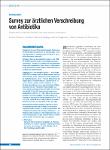Survey zur ärztlichen Verschreibung von Antibiotika: Ergebnisse zur akuten Zystitis in der ambulanten Versorgung
A Survey of Outpatient Antibiotic Prescribing for Cystitis
Velasco, Edward
Noll, Ines
Espelage, Werner
Ziegelmann, Antina
Krause, Gérard
Eckmanns, Tim
Hintergrund: Vor dem Hintergrund steigender Resistenzraten werden Einflussfaktoren auf die Verschreibung spezifischer Antibiotika bei unkomplizierter Zystitis in der ambulanten Versorgung untersucht. Methoden: Nationale Querschnitterhebung im Jahr 2008 bei niedergelassenen Ärzten (Innere Medizin und Allgemeinmedizin, Chirurgie, Frauenheilkunde und Geburtshilfe, Kinder- und Jugendmedizin, Hals-, Nasen- und Ohrenheilkunde, Dermatologie sowie Urologie), Stichprobenziehung auf Basis der Facharztregister. Ergebnisse: 60 % der befragten Ärzte (n = 1 810) treffen täglich Entscheidungen über die Einleitung einer antibiotischen Therapie, wobei „unkomplizierter Harnwegsinfekt“ die häufigste Diagnose ist (n = 715). Die Mehrzahl der Befragten gibt an, bei dieser Diagnose Cotrimoxazol (61 %) zu verschreiben, gefolgt von Fluorchinolonen (21 %). Die folgenden Faktoren weisen eine statistisch auffällige Assoziation mit der Präferenz für Fluorchinolone auf: Fachrichtung Gynäkologie (Odds Ratio [OR] 0,47; Konfidenzintervall [KI]: 0,27–0,80), Praxisstandort in den neuen Bundesländern (OR 2,01; KI: 1,16–3,46), ein Verordnungsverhalten, das eine Umstellung von einer empirischen Therapie auf eine gezielte Therapie beinhaltet (OR 1,72; KI: 1,02–2,90), sowie die Absicht, dem Patienten Unannehmlichkeiten ersparen zu wollen (OR 2,14; KI: 1,25–3,68). Diskussion: Obwohl Fluorchinolone aufgrund der Resistenzentwicklung nicht mehr als Mittel der ersten Wahl empfohlen werden, werden sie noch häufig verordnet. ARS – Antibiotika-Resistenz-Surveillance in Deutschland – veröffentlicht aktuelle regionale und Patientengruppen-spezifische Resistenzraten, um gute klinische Praxis zu fördern und die Qualität der Verordnungen zu verbessern. Background: In view of the currently increasing rates of antibiotic resistance, we studied the factors that affect the prescribing of specific antibiotics for uncomplicated cystitis in outpatient care. Methods: A nationwide cross-sectional survey of physicians in private practice in various specialties (internal medicine, general medicine, surgery, obstetrics/gynecology, child and adolescent medicine, otorhinolaryngology, dermatology, urology) was carried out in 2008. The sample was derived from the German state directories of medical specialists. Results: 1810 (60%) of the physicians surveyed reported that they made decisions about antibiotic treatment every day, with uncomplicated urinary tract infection as the most common diagnosis (715 physicians). The antibiotics that they prescribed most commonly for it were cotrimoxazole (61%) and fluoroquinolones (21%). The following factors were significantly associated with a preference for fluoroquinolones: being a gynecologist (odds ratio [OR] 0.47, 95% confidence interval [CI] 0.27–0.80), location of practice in the former East Germany (OR 2.01, CI 1.16–3.46), a treatment strategy incorporating a switch from empirical to targeted treatment (OR 1.72, CI 1.02–2.90), and the stated intention of avoiding inconvenience to the patient (OR 2.14, CI 1.25–3.68). Discussion: Fluoroquinolones are no longer recommended as the drug of first choice for uncomplicated urinary tract infections because of the development of resistance, but are still commonly prescribed for it. ARS (Antibiotic Resistance Surveillance in Germany) publishes current regional and patient-group-specific resistance rates to promote good clinical practice and improve prescribing behavior.
Dateien zu dieser Publikation
Keine Lizenzangabe

